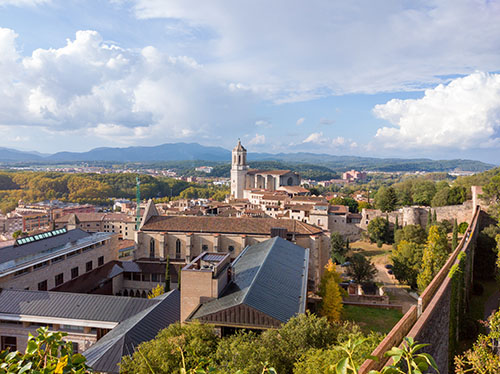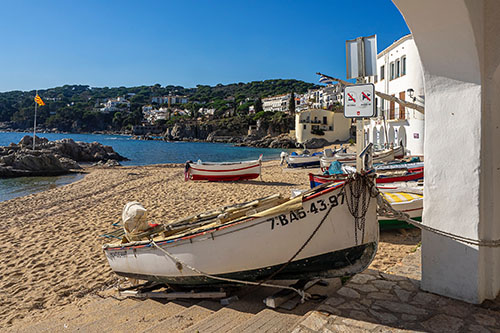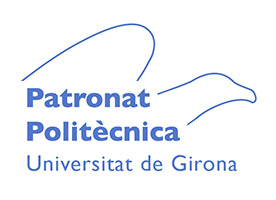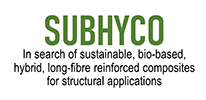CONFERENCE overview
The irreversible nature of the thermoset matrices used in most current structural composites is responsible for their non-sustainable character: technical fibers, such as carbon fibers with a huge embedded energy, cannot be recovered at the end of their life, and repurposing of components is not feasible because of the impossibility of reshaping.
The pursuit of sustainable alternatives to traditional thermosets has led to numerous novel and promising polymers. Each of them poses manufacturing challenges and has performance limitations. As a result, their use as matrices for composites in advanced applications needs in-depth investigation. To address this issue, there are many ongoing studies on the processing and mechanical performance of fiber-reinforced sustainable polymers. However, their dissemination is scattered among general conferences on composite materials.
This workshop aims to gather scientists and engineers on chemistry, materials science and mechanical engineering, involved in the development of sustainable polymers design as matrices for structural composites, and in particular in their processing and mechanical performance characterization. Therefore, the scope of the workshop includes topics such as:
-
Bio-based thermosets
-
Vitrimers and other Covalent Adaptive Network polymers
-
Depolymerizable polymers
-
High-performance thermoplastics
and the study of their mechanical properties (stiffness, strength, toughness, fatigue, time-dependent behavior, etc.) as well as their thermal degradation and processing related properties, among other topics. Of particular relevance is the research carried out to evaluate the processability and practical use of these materials in different structural applications (aeronautics, automotive, railway, ships, etc.). The SUSMATx workshop aims to bring these topics to the forefront of the debate. The objective is to enable and encourage scientific exchange between researchers, creating a network of peers with a common interest.
Abstract submission deadline: 15 May 2024
Deadline for early registration: 14 June 2024
Final registration deadline: 7 August 2024
COMMITTEES
Daniel Sánchez Rodríguez (University of Girona, AMADE Research Group, Spain)
Raquel Verdejo Marquez (ICTP-CSIC, Polymer Composite Group, Spain)
Philippe Olivier (Toulouse, Composite Materials and Structure research group of Institute Clement Ader, France)
Jordi Farjas Silva (University of Girona, AMADE Research Group, Spain)
Laura Carreras Blasco (University of Girona, AMADE Research Group, Spain)
Isabel Bagudanch (University of Girona, AMADE Research Group, Spain)
Miguel Angel Lopez Manchado (ICTP-CSIC, Polymer Composite Group, Spain)
Marianella Hernández Santana (ICTP-CSIC, Polymer Composite Group, Spain)
Suman Thakur (ICTP-CSIC, Polymer Composite Group, Spain)
Sara Keiko Murase Fernández (Eurecat, Polymeric & Composites Processes, Spain)
Josep Costa Balanzat (University of Girona, AMADE Research Group, Spain)
Pere Maimí (University of Girona, AMADE Research Group, Spain)
Olivier De Almeida (IMT-Mines Albi, Composite Materials and Structure research group of Institut Clement Ader, France)
Silvia González Prolongo (Universidad Rey Juan Carlos, Grupo de investigación de alto rendimiento en Ciencia e Ingeniería de Materiales, Spain)
Maria Àngels Serra Albet (Universitat Rovira i Virgili, POLTEPO Research Group, Spain)
David Santiago Abraira (Eurecat, Chemical Technology Unit, Spain)
Antonio Mattia Grande (Politecnico di Milano, Aerospace Structures and Design, Italy)
Silvia de la Flor López (Universitat Rovira i Virgili, Department of Mechanical Engineering, Spain)
KEYNOTE speakers
“Short and continuous fibre thermoplastic composites for automotive applications: influence of manufacturing, temperature, moisture, and strain rate on mechanical properties” by Prof. Wim Van Paepegem (Ghent University, Mechanics of Materials and Structures group, Belgium)
“Bio-based precursors from vegetable oils and lignin towards thermoset materials” by Prof. Henri Cramail (University of Bordeaux, Biopolymers and bio-sourced polymers group, France)
“Sustainable and recyclable epoxy thermosets and their CF composites to design high-performance material” by Alice Mija (Université Côte d’Azur, Institut de Chimie de Nice, France)
INSTRUCTIONS for authors
The international committee congratulates all authors for submitting excellent works
Please read the following instructions carefully
Abstract Submission: Please email your abstract to susmatx2024@udg.edu by May 15th.
Language Requirement: All abstracts must be submitted and presented in English.
Extension: The abstract should not exceed 2 pages.
Keywords: Include up to 5 keywords relevant to your submission.
Figures and Tables: You may incorporate figures and tables into your abstract. Captions for these should be placed directly below each respective figure or table.
Citations: Use in-text citations in square brackets [1-5] within the text. A numerical list of references should be provided at the end of the paper.
If you have any doubts or queries regarding abstract submissions, feel free to reach out to us at susmatx2024@udg.edu.
The size allocated for each poster corresponds to DINA0 in portrait orientation (vertical). Authors are expected to bring the printed poster to the conference (no printing services will be offered). There is no specific poster template. The organization will not be held liable for any lost or damaged posters.
Posters should be hanged the morning (before 10:00 AM) of the day of the corresponding poster session. The local staff will provide support to this task. Authors are expected to be present next to their poster during the poster sessions for discussion.
Every presenter has 12 minutes to present, followed by 4 minutes for taking questions. Please, assure that the duration of your talk fits this time slot of 12 minutes.
Presentations will be launched from the organization computer (by no means from individual laptop computers).
VENUE information
The conference will be held at the Faculty of Arts and Education of the University of Girona, located next to the Middle Ages city wall, at the old town of Girona. The Faculty of Arts and Education is easily reachable by walk from the centre of the town (it takes between 5 and 15 minutes). Girona international airport receives direct flights from many airports in Europe. Girona high-speed railway station is in the middle of the line Barcelona-France with international high-speed services operated by Renfe.
It’s worth mentioning that Girona is not a city for just passing through. There are so many places to start your visit. At the cathedral, with its immense nave; along the labyrinthine streets of the call, the old Jewish quarter; at the Romanesque monastery of Sant Pere de Galligants; at the Gothic basilica of Sant Feliu; at the colourful houses and the bridge over the Onyar river; or at the huge city walls. So many years of history and culture are concentrated in the city that it’s best savoured at a leisurely pace.
The coastline (Costa Brava) will also take your breath away with the beauty of its superb beaches and heavenly coves nestled among cliffs, not to mention typical Mediterranean towns.
REPOSITORY
The slides, abstracts and video-recordings of non-confidential presentations will be publicly available through the Univ of Girona repository as open access. It is a searchable and well-managed repository.
Conference fee for ON SITE attendance.
- Early bird fees (before 14 June): 300 Euros
- Standard fees (after 14 June). 400 Euros
- Student’s fees (before 14 June): 200 Euros
- Student’s fees (after 14 June): 300 Euros
- Companion: 70 euros*
*Inlcudes: gala dinner and guided tour of the historic quarter of Girona.
Contact SUSMATx 2024
Escola Politècnica Superior-Edifici P-II (Campus Montilivi), Av. Montilivi s/n 17003 Girona
Email: susmatx2024@udg.edu
Web: susmatx2024.udg.edu
















